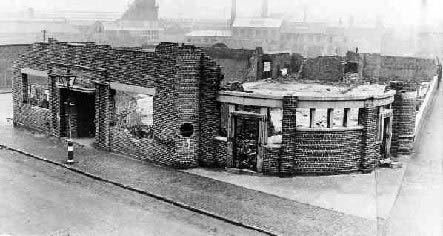Dantes Inferno by John Young >>
The Black Water Tank by John Houghton >>
amelia Liddall Killed by a Bomb by John K colin >>
Memories of Wartime by Sylvia Sayers (nee Wallace) >>
Polly The clippie by John Houghton >>
Essential Workers by christine Pounder >>
air Raids by Jean cookson (Dykes) >>
Memories of Dad and Grandad by Jenny Nicoll >>
air Raid Precautions >>
The anderson Shelter >>
Building and anderson Shelter
Rationing >>
Recipe for a Woolton Pie
Ice cream at Lewis's by Peter Walker >>
The School Party by Diana Poppitt >>
W M Taylors, Potters Hill by Dorothy Dodson >>
Listen to an air Raid Siren >>
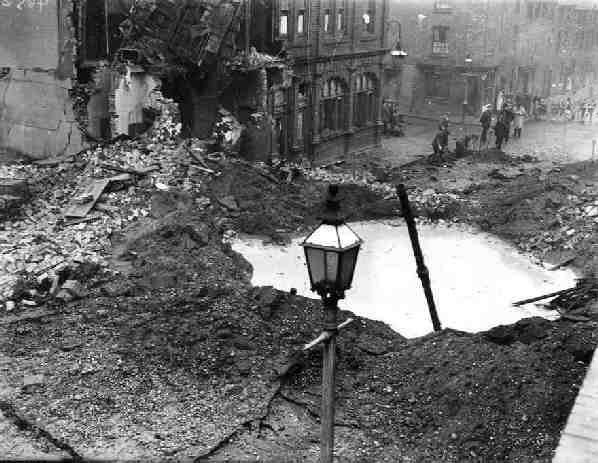
Bomb Damage in Newtown Row 17th October
1940
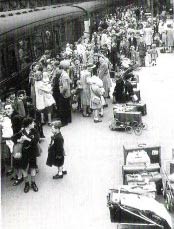
I was born in Birmingham and my mother, sister and I lived at number 38 Queens Road, aston. My father died in 1936 as a result of pneumonia. I can still remember going to his funeral. I was 6 years old. We all drove to Witton cemetery in horse drawn carriages.
When the war came, it was a terrible time. The air raids were very bad. We had to go out in freezing nights to sit in the metal shelter in the back garden. Then, in the November of 1940, land mines blew up almost all of Queens Road and we lost everything. The air raid wardens dug us out of our shelter as there were piles of bricks and broken glass blocking the entrance. We were taken to 'atkinson's Brewery' at the end of Queens Road where we stayed on mattresses on the floor. We were eventually evacuated to Stoke works in Bromsgrove where we were billeted in salt workers homes for a few months until my mother rented a cottage and we gradually put our lives back together as best we could in a strange but safer place.
My sister and I will always be grateful to our mother who sadly died in 1979 aged 87. She looked after us and protected us, she was always calm.'
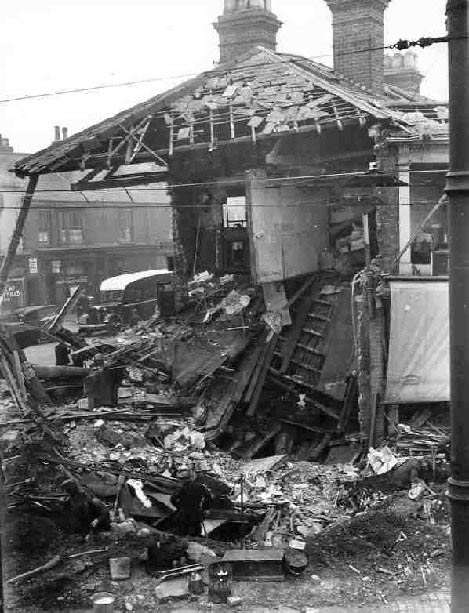
Bomb Damage in Newtown Row
My friends father was a Bus/Tram driver during WW2 and a Fire Warden during the little spare time that he or anyone else had in those times. His Dad told us of the terrible destruction of his Bus Station & the memories of which haunted him for the rest of his life.
William (Bill) to his mates just finished late shift and parked up then waited for his clippie to get her handbag, coat and things like ladies always do. The Drivers always walked their clippies home on dark and dangerous nights but this time she said "Its ok Bill, you go on, I am meeting the girls and we are going home together, Thanks Luvvy".
Bill had walked to aston cross by the time the air raid sirens wailed then he heard the explosions and turning round he could see the inferno erupting in the sky and just knew somehow that it was his Garage hit. He ran back to what he called Dantes Inferno, he helped the Firemen, Wardens, Police, local people.
Everybody did their best but it was total devastation, they toiled all night, rescued a few lucky souls, Bill finally collapsed with exhaustion and emotion when he found His clippies coat and handbag amongst the smouldering ruins.
To all Our Heroes, Thank You
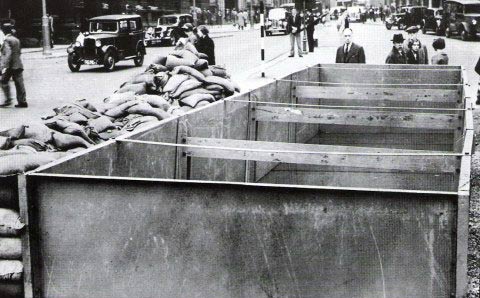
Static Emergency Water Storage Tank
Standing on the corner of Park Lane & Sutton Street stood this quite large black water tank (Similar to the one pictured above); it was about 30 feet in length 15 feet wide and about 4 to 5 feet deep. and would have held a few hundred gallons of water. This is only an estimate as young lads we did not know much about measurements it was taller than me, we had to climb up to see inside.
It was constructed out of steel sheets and riveted together the same as a ship was constructed. The water was always very cold and looked dirty some kids were brave enough to have a dip. My efforts were just to run my hands through the murky waters. I never learnt to swim till I was thirteen thanks to Mr Milner throwing me in the deep end at Victoria Road swimming baths, and that was on my thirteenth birthday.
Back to the tank the idea behind these tanks was to supply water to the fire services in the event of the main water supply ruptured hit by bombs during the air raids. Then the pump tender would put a siphon hose into the tank so they could extinguish any buildings that where on fire. Some times they would have to connect the hose's in long lengths so as to get the water to the fire. This stood on the corner for a long time after the war I often wonder what happened to that tank perhaps some one from Robbo's cafe would have known because it was directly opposite their shop.
John Houghton
amelia Liddall was killed at Miller Street Tram Depot on the 10th april 1941,
she was aged 41, her father was the late alfred Liddall of 9 Miller Street,
ameila lived in Harborne at 68 Blandford Road. I think that amelia was the only
person to be killed in this bombing, as I cannot find anyother names, there were
probably a few more injured, but only one death.
John K colin
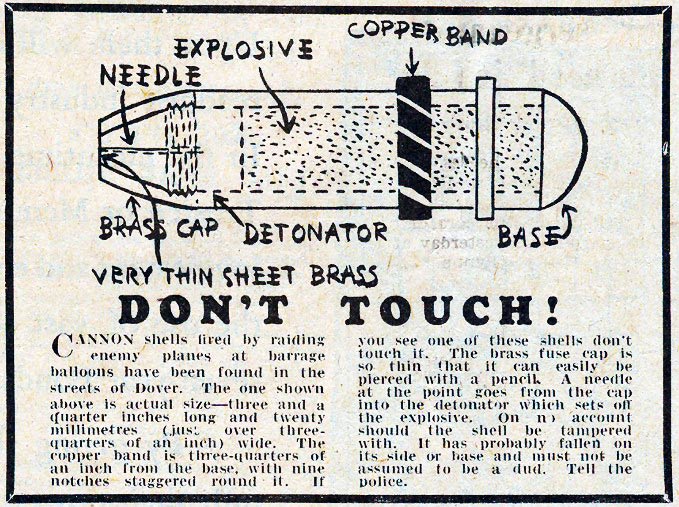
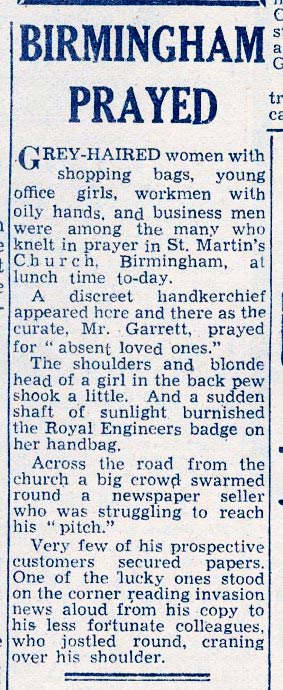
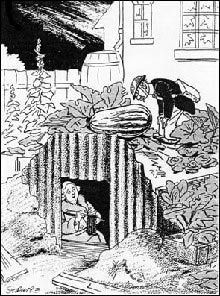
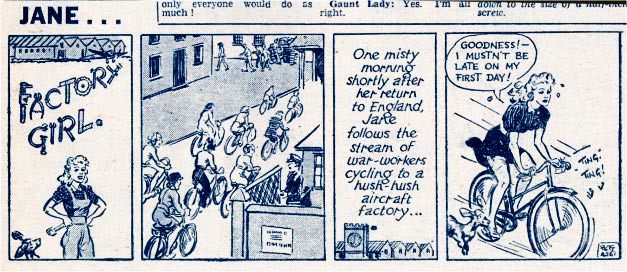
Memories of Wartime by Sylvia Sayers (nee Wallace)
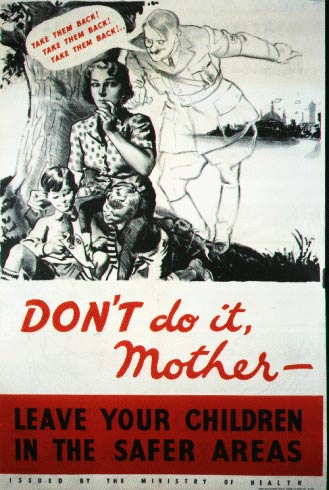
It was a very happy childhood and I can never remember being afraid, I suppose I was lucky because my dad was too old for the army having served throughout the First World War from the age of 15, and we were not bombed out.
We used to use our coal cellar as a shelter it had been distempered and there was old furniture down there, sofas and armchairs, but I slept through the raids.
There were food shortages and occasionally our next door neighbour Mr. Turner who kept chickens would send an egg round for me.
My mother worked at Hercules and she said it was a proper swop shop,people who did not take sugar would swop their rations for some other commodity.
My brother Ted Wallace went into the Royal Navy when he was l8 in 1944 and was sent to what was then ceylon and he sent us a large wooden box full of loose tea, he had stitched the box in hessian and it arrived intact, mom was over the moon, our family were massive tea drinkers but there was plenty to swop, for sugar, bacon, butter, clothing coupons or whatever else she could get.
On another occasion he sent a box of toilet soap where he got it from we never knew, but that was also in short supply.
My next door neighbour Bert Storer was stationed in West africa and he sent me a whole coconut, not like the ones we see, but it was like a rugby ball with a shiny black outer layer on which we had burnt my name and address and attached the stamps, I never forget the excitement when that arrived.
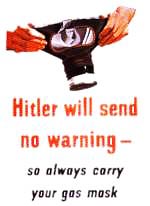
Sweets were rationed until about 1953/4 and Mr. Taylor who kept the shop on the corner of Burlington/Talford Street would often let his customers' children have a few sweets that were stuck at the bottom of the large glass jars (off the ration).
My brother was demobbed in australia and settled there, he married in 1947and his wife sent the top tier of the wedding cake for us as we were unable to go to the wedding, again it came in a box sewn into calico, but all the icing had fallen off, was I popular at school when I took the icing for my friends to share.
We also heard that you could get chocolate from Timothy Whites the chemists, this turned out to be EX LaX you can imagine the results.
Lots of other memories of being sent to wait in queues at Griffins if there were tomatoes or any fruit available, and going to Norris and the butchers next door to Fosters on Newtown Row to ask if they had any offal as this wasn't rationed.
Polly The clippie by John Houghton
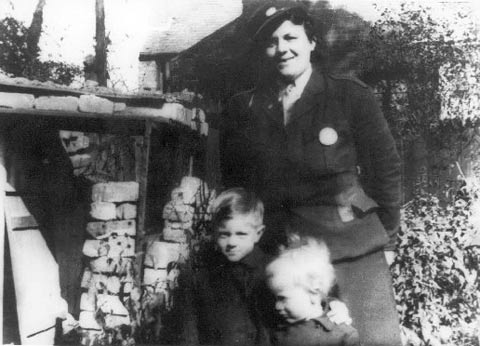
My mom worked at Hockley Brook bus depot during the war as a bus conductoress. My memories are of her bringing her ticket machine and a black box, which had rows of different coloured tickets, being different money denominations. also in the box her ticket holder it was about a foot long made of wood, the tickets were held in with springs, the box was about fourteen inches square the lid was about a foot square and painted black. The ticket machine was a punch type you put the ticket in and pressed a lever the machine would ring and pierce a hole in the ticket for the destination where you got on the bus. change was also inside the box with different coloured paper bags for the different coinage.
There were two different smells associated with my mom work stuff the leather smell from the straps which held the ticket machine in place over her shoulders and the smell from the box hard to describe but a combination of the tickets and the money I think. and her jacket also had a leather smell, "I smelt this when she gave me a cuddle before going out to work" as it had leather around the pockets to stop the jacket wearing from wearing the ticket machine.
Essential Workers by christine Pounder
Because of his poor sight my Dad was not in any of the armed services during WW2 and my Mom would never let him talk about his experiences at home in the war, all we kids heard about was her time in the a.T.S. and her army, Navy and air Force friends. Which I know was very important, but it would have been nice to know about how life was for people like my dad who were working just as hard on 'The Home Front'. I do know that he was in the Red cross and helped as an ambulance assistant, he also helped with rubble clearing after air raids on Birmingham. So coming from aston and living at 230 Park Lane he more than likely help clear those sites mentioned in the new section. He once told me about seeing the big air raid on coventry and standing under 'The Minories' by Lewis's seeing the sky light up just like a big fireworks extravagance.
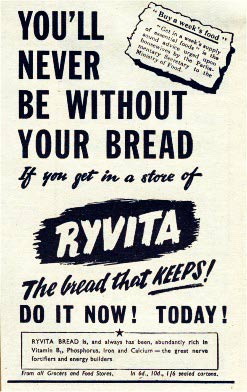
air Raids by Jean cookson (Dykes)
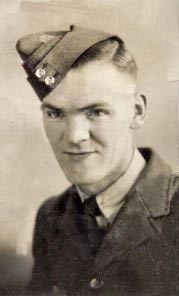
I was born in Loveday Street Maternity Hospital in1942, in between air raids, so my memories probably occurred towards the end of the war. We lived at 2/13 Vicarage Road. I remember the blackout curtains being closed every night and my mother turning down the gas light in our bedroom. When the air raid siren went we got dressed and ran down to the air raid shelter, which was, I think, down the bottom of Portland Street.
My Dad was barely 21 when he was called up to the air Force, stationed at Biggin Hill during the Battle of Britain and worked on the fire engines. He didn't get to sleep in a bed for three weeks at that time and remembered Stukas dive-bombing the air raid shelters on the base. When the rumour started that Birmingham had been bombed, Dad and a friend went a.W.O.L. and walked from Biggin Hill in Kent to aston to make sure their families were still alive. Of course, when they arrived they found out that coventry had been bombed, not Birmingham. after he had been home for a night, the Military Police arrived (thanks to one of the neighbours who still wasn't forgiven by 1964), and he did two weeks in "jankers".
For more than 20 yrs after the war, Dad "feel" a plane coming from about 10 miles away and could identify the make by the sound of the engine. He came home in 1946, when I was 4 yrs old, and if I close my eyes I can still see him coming through the door
Memories of Dad and Grandad by Jenny Nicoll
My Mother's Father, John had moved in with my father and mother during the war. He was living in Brantley Road Witton and then moved to Hidson Road Marsh Hill. although there was an anderson shelter in the garden the favourite spot was in the pantry close to the stairs where my Mother her first born son and her Father shoehorned in whilst Hitler's bombers looked for the IcI and GEc.
My Father was often holed up in Bournville Power Station hoping that Gerry hadn't got that station on their list for several nights or that he wasn't blown off his bike as he cycled the many miles from Erdington to Bournville and back. He slept under a heavy wooden table when on night shift with only a cat and mice for companions.
I was on the way in l941 and my Mother knitted furiously in the bomb raids to prepare for my birth. Mother told me how frightened she was most of the time especially after that menace Lord Haw Haw would spell out local targets for that evenings bombing via the radio. My Grandfather was very restless. He was 80 years old. Mom and Dad removed the bulbs from the landing and hall lights. The large long window on the stairs then didn't have to have any black out since everyone used shaded torches to find their way around on the stairs and in the hall. Grandfather had his own torch and frequently used to get up in the night to make tea. He was unsteady on the stairs and would flash his torch around all over the place on his way to the kitchen.
My parents didn't know about this and one night there was a loud knock on the front door. The head of local patrol officers told my parents that for several nights strange darting lights had been seen coming from our landing window and were going straight up into the sky. The officer wanted to know what was going on. It some time before it was realized that Grandfather was the culprit....almost accused of signalling to the German aeroplanes that came over frequently. all was sorted out and a blackout curtain was hastily made for the landing window!!!
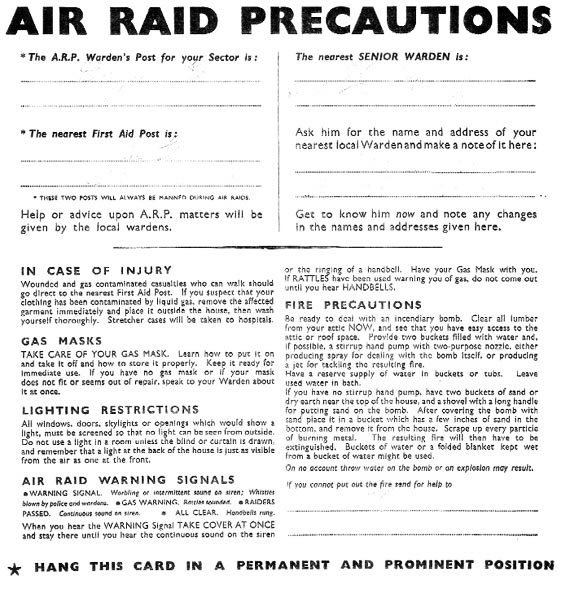
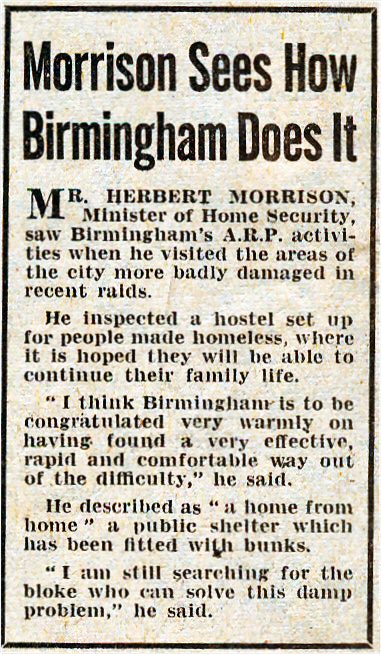
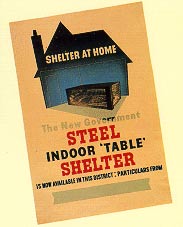
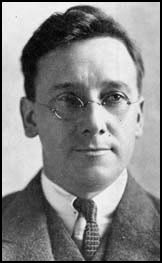
Morrison
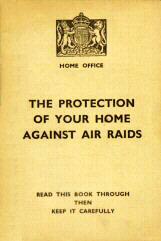
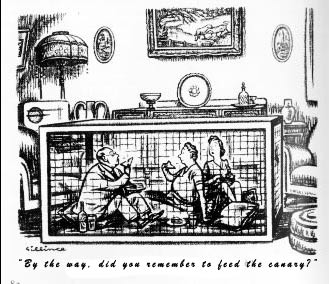
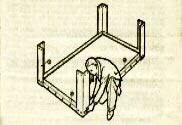
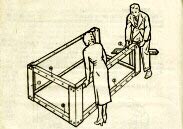
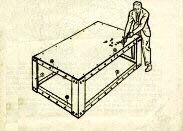
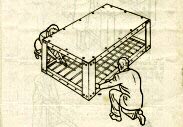
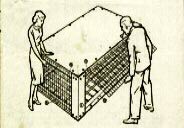
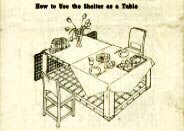
assembling a Morrison Shelter
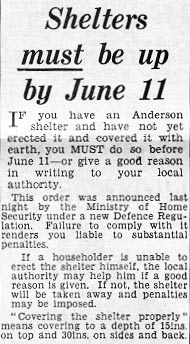
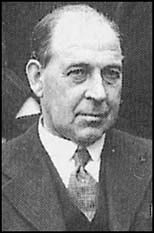
anderson
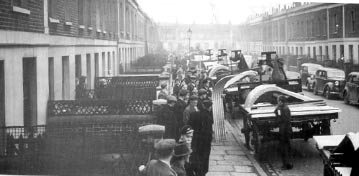

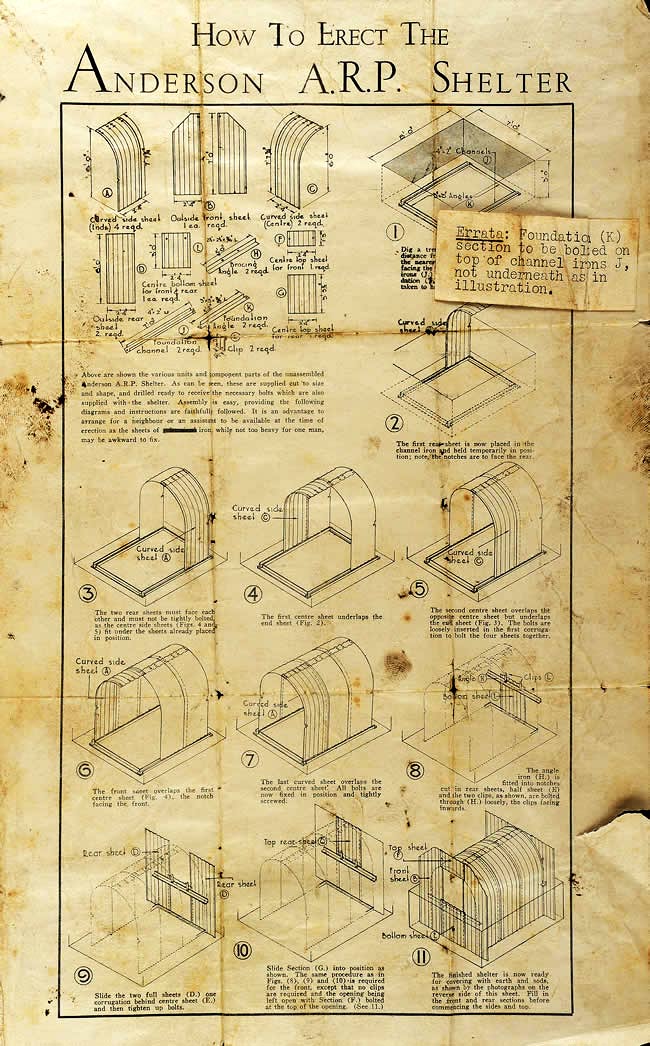
How to Build an anderson Shelter - Watch a Video >>
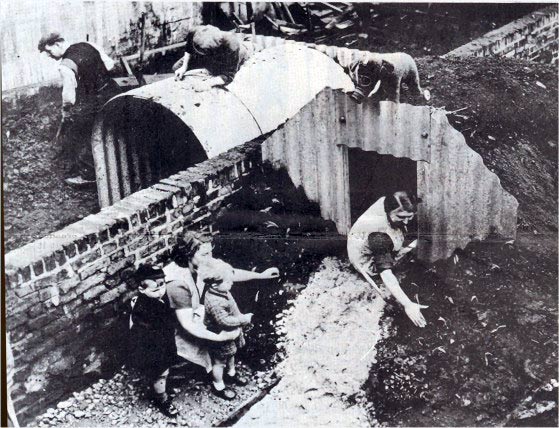
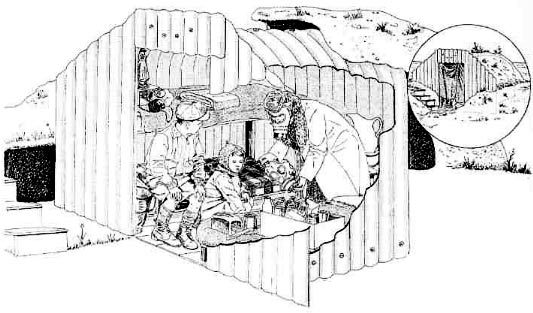
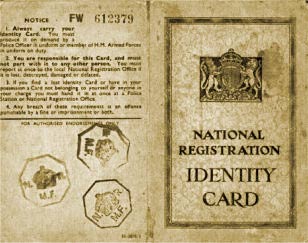
This is the ration for one adult per week.

BacON and HaM ... 4ozs ( 100g )
MEaT ........ to the value of 1s.2d ( 6p today )
Sausages were not rationed but difficult to obtain
Offal was originally unrationed but sometimes formed part of the meat ration
BUTTER ....... 2ozs ( 50g )
cHEESE ....... 2ozs ( 50g ) sometimes it rose to 4ozs ( 100g ) and even up to
8ozs ( 225g )
MaRGaRINE ...... 4ozs ( 100g )
cOOKING FaT ..... 4ozs ( 100g ) often dropping to 2ozs ( 50g )
MILK ........ 3 pints ( 1800ml ) sometimes dropping to 2 pints ( 1200ml
)mHousehold ( skimmed, dried ) milk was available. This was I packet each 4
weeks
SUGaR ........ 8ozs ( 225g )
PRESERVES ...... 1lb ( 450g ) every 2 months
TEa ......... 2ozs ( 50g )
EGGS ........ 1 shell egg a week if available but at times dropping to 1 every
two weeks. Dried eggs ----- 1 packet each 4 weeks
SWEETS ........ 12 ozs ( 350g ) each 4 weeks
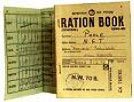
In addition, there was a monthly points system. as an example of how these could be spent, with the 16 points that you were allocated you were allowed to buy one can of fish or meat or 2lb ( 900g ) of dried fruit or 8lb ( 3.6kg ) of split peas. Babies and younger children, expectant and nursing mothers had concentrated orange juice and cod liver oil from Welfare clinics together with priority milk. This milk was also available to invalids.
School meals were started in the war because mothers were working extremely long
hours to help the war effort
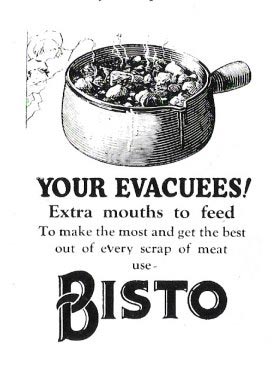
Take 1Ib each of diced potatoes, cauliflower, swedes
and carrots;
Three or Four spring onions;
One teaspoonful of vegetable extract and
One teaspoonful of oatmeal.
METHOD
cook all together for ten minutes with just enough water to cover.
Stir occasionally to prevent the mixture from sticking.
allow to cool; put into a pie dish,
sprinkle with chopped parsley and cover with a crust of potatoes or wholemeal
pastry.
Bake in a moderate oven until the pastry is nicely brown and serve hot with
brown gravy.
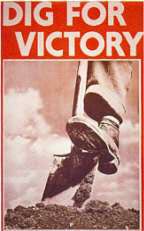
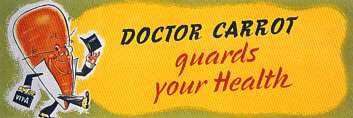
Ice cream at Lewis's by Peter Walker
With rationing and so on, I think ice cream went off the menu from some time in mid to late 1940.
The next I remember about ice cream was at a department store in Leicester in early 1945, (I think it was another branch of Lewis's, but I am not sure now), when a substance looking like off-white non-drip emulsion paint was being put into cornets that were probably years old.
as I remember, the taste was mainly of powdered milk, saccharin and cornflour, and it left behind an unfamiliar feeling on the tongue, reminiscent of diluted cod liver oil. Yuk. Not long after that, a similar substance was sold at the Birmingham Lewis's, as I remember in the base lobby in Bull Street close to Grey's.
Shortly after came the d-i-y machines where I think you turned a small lever rather than pressed a button, and the mixture oozed into your empty cornet. I believe you paid a cashier before leaving, rather than putting cash into the machines at that time. I would guess now that it was not until 1946 or 47 that the battery of slot machines Sylvia Sayers mentions were working.
By that time, ice cream was quite nice, I remember.
The School Party by Diana Poppitt
I don't think I ever knew why we had a school party, and I don't think it was at christmas. The preparations went on for weeks, first we had to decide who would bring what type of food. Mothers had a reputation to keep up, and mine was favoured for her trifles, and she pulled out all the stops:
Sponge in the bottom, well soaked in fruit juice. I had the job of cutting the block of jelly into squares before it was covered with boiling water and left to set on the back window ledge. Then I squished it down into a pulp to pile on top of the sponge. Next the tin of fruit was added, and the kind depended on what was in the family box of goodies that an aunt majically conjoured up. and finally pink blancmange was poured over the top. There was no cream, it would be years before I discovered its delight.
The sandwiches were pretty awful, fish paste, jam and if we were lucky somebody would bring cheese, or there could be egg and cress. Everbody grew cress on the kitchen windowsill.
There were alway two or three jellies, sometimes there was a tin of condensed milk to pour over the top, and some wonderful mom would bake fairy cakes and put a glace cherry on top.
It wasn't a banquet, but with rationing in full flow it took a bit of ingenuity to produce, and as kids we loved every minute of it.
W M Taylors, Potters Hill by Dorothy Dodson
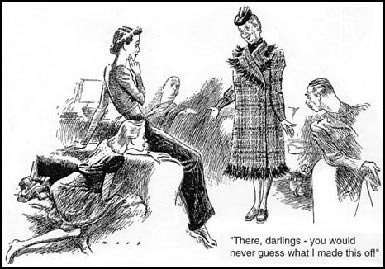
W M Taylors Potters Hill, Do i remember that shop - I say do i remember that shop. I certainly do. I remember the haberdasher counter, and Miss clarke(?) used to preside over that one. She used to wear a high collar made of lace .. my mum seemed to think it was due to her getting burned in earlier years. But my mum would get my hair ribbons from there.
also i remember, one day one of the neighbours stopped to whisper to my mum that Taylors had some muslin, and i remember mum, getting her coat on sharpish and headed for Taylors, to buy a few yards (this was when all materials where on clothes coupon points) and muslin was not included in the rationing, anyway she made it into net curtains, dyed a shade of gold or pink (whichever dye she could buy)
at christmas they used to have Father christmas and all of us kids would be waiting outside the store early on the Saturday Morning, it was always a Saturday. I think (with hindsight) Santa would be one of the Taylor Brothers, and he would arrive on a lorry decked up like a sleigh ... and before he went into the store (never can remember how he got from that 'sleigh' into the store) he would throw handsful of coins, which we would all make a mad dive for. and a few fights would be break out, ahh that's how he managed to divert our attention - while he got off the sleigh.
and i also remember that my dad used to talk about Ridley and Betts the two villains who waylaid the old chap employed by Taylors. It seems that he used to take the cash takings to the bank on an old handcart, at the same time every week, and they watched this and decided to follow him, it seems that they attacked him in Bartons Bank. But my dad also told me that Betts was the one who actually attacked the old chap. But that because they were both in on it, there was petition got up to try to get Betts off. I seem to remember that my dad said that nobody would sign it.
Incidentally there was also a W M Taylors in Erdington 'Village' (High Street)
and i remember that little sweet shop next door to the Bartons arms, but cannot remember the name of it. We didn't go in very often, because when I was a kid, it was sweet rationing, and generally when the sweet shops got their sweets quota, they were inclined to only serve the local regulars. and my local sweet shop was 'Hoopers' in Tower Road.
Oh Happy Days, scabies, nits, ricketts
Listen to an air Raid Siren
click on the siren to start
